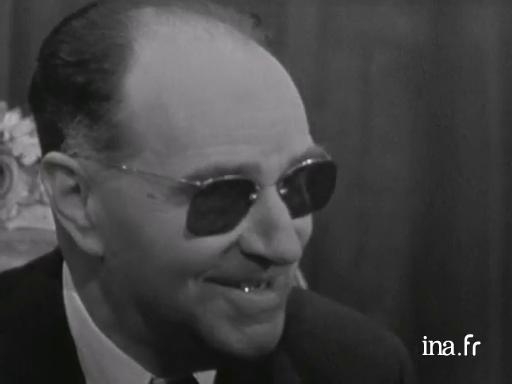Lucienne Bernadac
I have the pleasure of presenting you, right now, with one of the greatest composers
that Spain can boast about,
the one whose name has been in the music news for the last few years: Joaquin Rodrigo.
"Music for You" has invited Joaquin Rodrigo tonight to pay him a double tribute:
a tribute to the composer,
and also and especially, a tribute to the man who, blind since the age of three,
has courageously struggled to earn a spot, a very large spot in the career that he selected.
Joaquin Rodrigo, I know that you speak very good French, you've stayed in Paris for a long time,
and I also want to ask you some details about your career.
You were born in the Valence province?
Joaquin Rodrigo
Yes, in Sagunto, a very old city.
I came to Paris in 1937 to work at the Normal School of music with Paul Dukas.
Lucienne Bernadac
Were you one of Paul Dukas's favourite students?
Joaquin Rodrigo
Yes, that's true.
And, also, to follow the Spanish tradition, d'Albéniz, de Falla and de Turina came to Paris to work.
Lucienne Bernadac
Did you know Manuel de Falla?
Joaquin Rodrigo
In Paris, certainly.
Lucienne Bernadac
And then?
Besides, we must specify that at this time, already,
your first compositions received a successful reception in Paris.
Joaquin Rodrigo
Yes, it was Ricardo Vines's work,
a great Spanish pianist who was very Parisian and who gave me several works,
especially the Prélude au Coq Matinal which I will play tonight.
Lucienne Bernadac
I believe that this Prélude au Coq Matinal has played a crucial role in your life?
Joaquin Rodrigo
Decisive.
Believe it or not, thanks to that, I found my wife.
Lucienne Bernadac
You met your wife?
Joaquin Rodrigo
Yes, and it was in Paris.
She read about this prelude in a musical review.
She was moved by what was written so she looked for the composer all over Paris and she finally tracked me down.
Lucienne Bernadac
She found you so well that she kept you.
Joaquin Rodrigo
She was an excellent pianist from [inaudible] who had, most likely, a decisive influence on my career and training.
Lucienne Bernadac
You then went back to Spain.
Joaquin Rodrigo
We left for Spain.
We got married there.
I won a scholarship.
We went back to Paris and this time it was to work on the history of music with Maurice Emmanuel.
Lucienne Bernadac
And war definitely established you in Madrid.
Joaquin Rodrigo
Based in Madrid.
Lucienne Bernadac
I think that it was the following year, in 1940, that your name became international
thanks to your first big work, a Concerto for guitars and orchestra, the Aranjuez concerto.
Joaquin Rodrigo
Aranjuez.
Lucienne Bernadac
And it must be said that it was audacious on your behalf, incredibly audacious to debut
when your name wasn't yet very known for guitar works.
Joaquin Rodrigo
I wrote it in Paris, this concerto.
I performed it, as you said, in 1940.
Everyone said it would be a failure, that it wouldn't sound right.
And there you go, it was a success.
Lucienne Bernadac
A triumph.
Joaquin Rodrigo
It went around the world.
Lucienne Bernadac
And this concerto was followed by many other works that also encountered success.
Joaquin Rodrigo
Yes, I wrote several concertos for piano, for violin, for cello, even for harp.
And finally, things for guitar as well, important, a fantasy, a duo.
And several orchestra melodies, etc...
Lucienne Bernadac
A very important work.
We can even say that you're a fulfilled composer.
You received, from your country, great awards.
Joaquin Rodrigo
Well, I can't complain.
I won several prizes, notably the national prize, the Cervantès prize, etc...
And finally, I was given the Great cross of Alfonso X the wise.
And finally, it was the peak for me, the French government awarded me...
I'm a Knight of the Arts and Letters.
Lucienne Bernadac
And you also hold a chair at the university of Madrid.
Joaquin Rodrigo
I teach music history at the Philosophy Faculty.
So I can exercise my influence on young people, which interests me greatly.
Lucienne Bernadac
You exercise it greatly.
You are at the same time a highly regarded composer, a good pianist, a lecturer, a writer, a musical critic
and you've also travelled the world, been in America several times.
Joaquin Rodrigo
Yes, several times, and Europe, often and especially Paris.
And here we go, I find myself in Paris once again.

















